八年级英语下Unit4 Reading She said helping others changed her life.
- 格式:pptx
- 大小:5.26 MB
- 文档页数:67
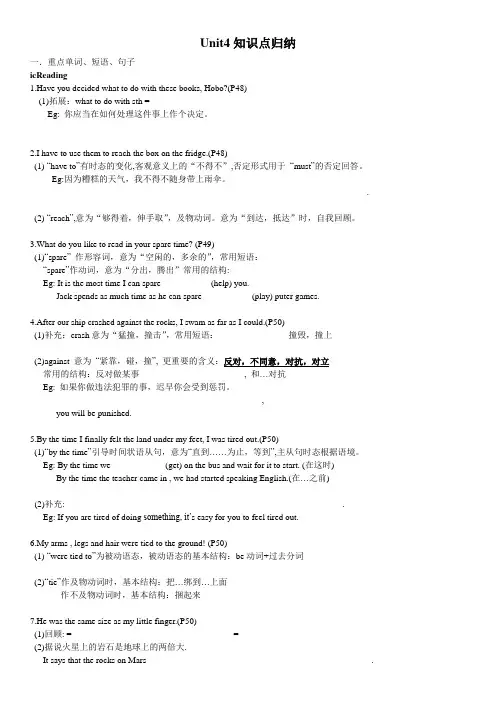
Unit4知识点归纳一.重点单词、短语、句子icReading1.Have you decided what to do with these books, Hobo?(P48)(1)拓展:what to do with sth =_______________________________Eg: 你应当在如何处理这件事上作个决定。
______________________________________________________________________2.I have to use them to reach the box on the fridge.(P48)(1) “have to”有时态的变化,客观意义上的“不得不”,否定形式用于“must”的否定回答。
Eg:因为糟糕的天气,我不得不随身带上雨伞。
_____________________________________________________________________.(2) “reach”,意为“够得着,伸手取”,及物动词。
意为“到达,抵达”时,自我回顾。
3.What do you like to read in your spare time? (P49)(1)“spare”作形容词,意为“空闲的,多余的”,常用短语:__________________________“spare”作动词,意为“分出,腾出”常用的结构:_____________________________________ Eg: It is the most time I can spare ___________(help) you.Jack spends as much time as he can spare ___________(play) puter games.4.After our ship crashed against the rocks, I swam as far as I could.(P50)(1)补充:crash意为“猛撞,撞击”,常用短语:_______________ 撞毁,撞上(2)against 意为“紧靠,碰,撞”, 更重要的含义:反对,不同意,对抗,对立常用的结构:反对做某事________________________, 和…对抗_____________________ Eg: 如果你做违法犯罪的事,迟早你会受到惩罚。

初二(下)课文(翻译)(1—4)Unit 1 课文(翻译)志愿工作Voluntary['vɒlənt(ə)rɪ]志愿的 work三个青少年提出去做一些志愿工作,在学校假期期间。
他们写了以下的报告。
Three teenagers['tiːneɪdʒə]青少年offered ['ɒfə]提出;提供to do some voluntary work during在...期间 the school holidays假期. They wrote the following ['fɒləʊɪŋ]以下的 reports[rɪ'pɔːt]报告.我在儿童医院做了些志愿工作。
那里的儿童都遭受严重的疾病。
我们为他们组织了一个绘画比赛。
I did some voluntary work in a children’s hospital. The children there 那里all suffer from['sʌfə]遭受serious严重的;严肃的illnesses['ɪlnəs]疾病. We organized ['ɔrɡənaɪz]组织 a painting绘画 competition [kɒmpɪ'tɪʃ(ə)n]比赛for them.我遇见一个叫做辛迪的女孩。
她想要画一副她家附近公园的画。
我去那里并拍些照片。
辛迪用它们绘画。
I met a girl called Cindy. She wanted to paint [peɪnt] 画a picture of the park near herhome. I went there and took some photos 拍照of it. Cindy used them for her painting.Betty有很多孩子没有父母。
我和我妈妈遇见过一些这样的孩子,我们教他们讲故事。
这帮助他们表达他们的情感。
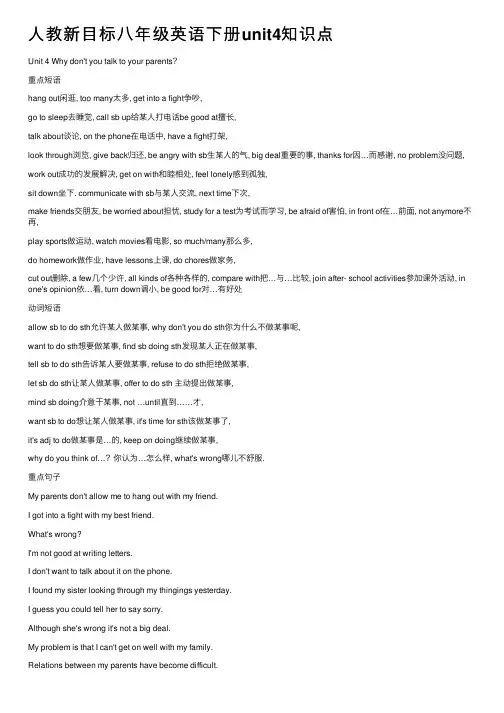
⼈教新⽬标⼋年级英语下册unit4知识点Unit 4 Why don't you talk to your parents?重点短语hang out闲逛, too many太多, get into a fight争吵,go to sleep去睡觉, call sb up给某⼈打电话be good at擅长,talk about谈论, on the phone在电话中, have a fight打架,look through浏览, give back归还, be angry with sb⽣某⼈的⽓, big deal重要的事, thanks for因…⽽感谢, no problem没问题, work out成功的发展解决, get on with和睦相处, feel lonely感到孤独,sit down坐下. communicate with sb与某⼈交流, next time下次,make friends交朋友, be worried about担忧, study for a test为考试⽽学习, be afraid of害怕, in front of在…前⾯, not anymore不再,play sports做运动, watch movies看电影, so much/many那么多,do homework做作业, have lessons上课, do chores做家务,cut out删除, a few⼏个少许, all kinds of各种各样的, compare with把…与…⽐较, join after- school activities参加课外活动, in one's opinion依…看, turn down调⼩, be good for对…有好处动词短语allow sb to do sth允许某⼈做某事, why don't you do sth你为什么不做某事呢,want to do sth想要做某事, find sb doing sth发现某⼈正在做某事,tell sb to do sth告诉某⼈要做某事, refuse to do sth拒绝做某事,let sb do sth让某⼈做某事, offer to do sth 主动提出做某事,mind sb doing介意⼲某事, not …until直到……才,want sb to do想让某⼈做某事, it's time for sth该做某事了,it's adj to do做某事是…的, keep on doing继续做某事,why do you think of…?你认为…怎么样, what's wrong哪⼉不舒服.重点句⼦My parents don't allow me to hang out with my friend.I got into a fight with my best friend.What's wrong?I'm not good at writing letters.I don't want to talk about it on the phone.I found my sister looking through my thingings yesterday.I guess you could tell her to say sorry.Although she's wrong it's not a big deal.My problem is that I can't get on well with my family.Relations between my parents have become difficult.I don't know if I should say anything to them about this.When they argue, it's like a big black cloud, hanging over our home.Although my elder brother is not very nice to me.Instead he watches whatever he wants until late at night.At home I feel lonely and nervous.If your parents are having problems you should offer to help.Maybe you could do more jobs around the house, so that they have more time for proper communication. Secondly , why don't you sit down and communicate with your brother?You should explain that you don't mind him watching TV all the time.My cousin borrows my things without returning them.You left your homework at home.You're afraid of speaking in front of people.Your best friend, doesn't trust you anymore.The Taylors are a typical American family.Maybe I could cut out a few of their activities.I really want them to be successful.However the tired children don't get home until after 7:00 p.m.They have a quick dinner,then it's time for homework.In some families, competition starts very young and continues until the kids get older.And they are always comparing them with other children.It's crazy.People shouldn't push their kids so hard.Doctor says too much pressure is not good for a child's development.Doctor Alice Green says all these activities can cause a lot of stress for children.重点1.allow sb to do sth允许某⼈做某事allow sth允许某事allow doing sth 允许做某事be allowed to do sth被允许做某事The doctor allowed him to take a short walk every day.I don't think she will allow it.We don't allow smoking in our house.We are not allowed to throw rubbish everywhere.2.Get into a fight with sb=Have a fight with sb.=fight with sb.和某⼈打架We can't get into a fight with each other at school.3.What's wrong?=what's the matter?询问某⼈有什么问题,有什么不顺⼼的事,询问某物出了什么⽑病?What's wrong?I left my bag on the bus.What's wrong with your finger?There is something wrong with my bike.Your answer is wrong but hers is right.4.Be good at擅长⼲某事, be good for对…有益be good to对…好be good with善于应付…的.He is good at drawing.Drink more water is good for you.She is very good to her neighbors.He's very good with children.5.On the phone⽤电话交谈, on the Internet 通过互联⽹on the radio.通过收⾳机What did you say on the phone?He is chatting on the Internet.6、Look through查看,浏览, look after照顾. Look at看着, look for寻找,look out of向…外看, look forward to doing.盼望⼲某事The through the passage quickly and answer the questions.7.I guess +宾语从句(变否定句时,否定要前移)I guess that he's right.I don't guess that he is right.8.Say sorry /hello /thanks/ goodbye to sb.向某⼈抱歉/问候/感谢/道别。
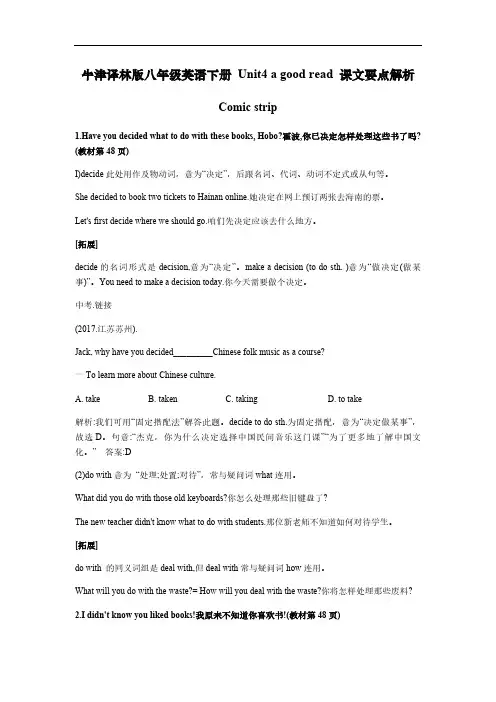
牛津译林版八年级英语下册Unit4 a good read 课文要点解析Comic strip1.Have you decided what to do with these books, Hobo?霍波,你已决定怎样处理这些书了吗? (教材第48页)I)decide此处用作及物动词,意为“决定”,后跟名词、代词、动词不定式或从句等。
She decided to book two tickets to Hainan online.她决定在网上预订两张去海南的票。
Let's first decide where we should go.咱们先决定应该去什么地方。
[拓展]decide的名词形式是decision,意为“决定”。
make a decision (to do sth. )意为“做决定(做某事)”。
You need to make a decision today.你今天需要做个决定。
中考.链接(2017.江苏苏州).Jack, why have you decided_________Chinese folk music as a course?一To learn more about Chinese culture.A. takeB. takenC. takingD. to take解析:我们可用“固定搭配法”解答此题。
decide to do sth.为固定搭配,意为“决定做某事”,故选D。
句意:“杰克,你为什么决定选择中国民间音乐这门课”“为了更多地了解中国文化。
” 答案:D(2)do with意为“处理;处置;对待”,常与疑问词what连用。
What did you do with those old keyboards?你怎么处理那些旧键盘了?The new teacher didn't know what to do with students.那位新老师不知道如何对待学生。
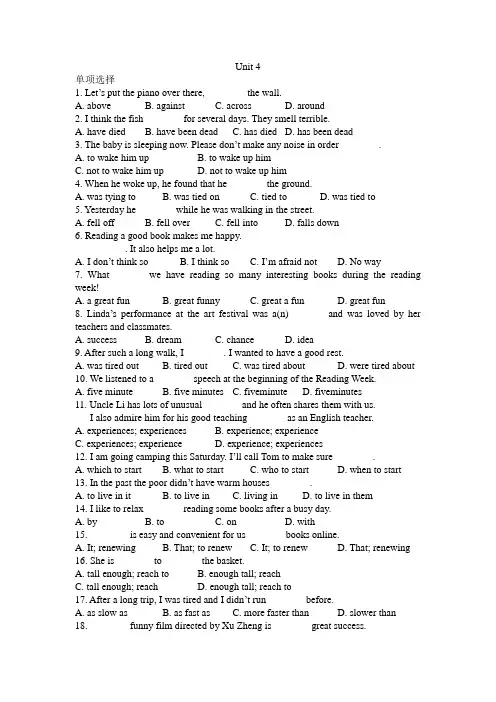
Unit 4单项选择1. Let’s put the piano over there, ________the wall.A. aboveB. againstC. acrossD. around2. I think the fish________for several days. They smell terrible.A. have diedB. have been deadC. has diedD. has been dead3. The baby is sleeping now. Please don’t make any noise in order________.A. to wake him upB. to wake up himC. not to wake him upD. not to wake up him4. When he woke up, he found that he________the ground.A. was tying toB. was tied onC. tied toD. was tied to5. Yesterday he________while he was walking in the street.A. fell offB. fell overC. fell intoD. falls down6. Reading a good book makes me happy.________. It also helps me a lot.A. I don’t think soB. I think soC. I’m afraid notD. No way7. What________we have reading so many interesting books during the reading week!A. a great funB. great funnyC. great a funD. great fun8. Linda’s performance at the art festival was a(n)________and was loved by her teachers and classmates.A. successB. dreamC. chanceD. idea9. After such a long walk, I________. I wanted to have a good rest.A. was tired outB. tired outC. was tired aboutD. were tired about10. We listened to a________speech at the beginning of the Reading Week.A. five minuteB. five minutesC. fiveminuteD. fiveminutes11. Uncle Li has lots of unusual________and he often shares them with us.I also admire him for his good teaching________as an English teacher.A. experiences; experiencesB. experience; experienceC. experiences; experienceD. experience; experiences12. I am going camping this Saturday. I’ll call Tom to make sure________.A. which to startB. what to startC. who to startD. when to start13. In the past the poor didn’t have warm houses________.A. to live in itB. to live inC. living inD. to live in them14. I like to relax________reading some books after a busy day.A. byB. toC. onD. with15. ________is easy and convenient for us________books online.A. It; renewingB. That; to renewC. It; to renewD. That; renewing16. She is________to________the basket.A. tall enough; reach toB. enough tall; reachC. tall enough; reachD. enough tall; reach to17. After a long trip, I was tired and I didn’t run________before.A. as slow asB. as fast asC. more faster thanD. slower than18. ________funny film directed by Xu Zheng is________great success.A. A; aB. The; theC. A; theD. The; a19. What bad weather! It’s raining hard all these days.Yes, the river has________by two feet.A. risenB. liftedC. grownD. raised20. I thought I couldn’t do it. But________, it’s quite easy.A. in factB. for exampleC. at firstD. as a result21. Did you hear that a thief tried to steal things from the Tiantian Supermarket?Yes! He tried to________but the police caught him at last.A. put awayB. take awayC. move awayD. get away22. Lucy, I saw you________the windows at 10 a.m. this morning.Yes. My mother often makes me________with housework at the weekend.A. clean; helpB. cleaning; helpingC. cleaning; to helpD. cleaning; help23. I saw some________and________dancing in the street the day before yesterday.A. Germans; EnglishmenB. Germen; EnglishmenC. Germans; EnglishmansD. Germen; Englishmans24. The girl sat________me, so I could see the sadness on her face directly.A. behindB. betweenC. outsideD. opposite25. Is your schoolbag________mine?Yes, it is.A. the same big asB. the same size asC. as bigger asD. as same size as26. Where is your homework? Please________before class.A. hand in themB. hand them inC. hand in itD. hand it in27. Everybody, listen to me. Be careful with the machines and you________touch any of them.A. mustn’tB. needn’tC. couldn’tD. may not28. I really like the game. Why must I stop playing it?For your study, you________, my boy.A. hope toB. have toC. would like toD. are able to29. We have two rooms________, but I can’t decide________.A. to live; to choose which oneB. lived; choose which oneC. to live in; which one to chooseD. live; which one30. There are many hair clips for you to________.But I don’t know________to buy.A. choose; whatB. choose; whichC. choose from; whichD. choose from; what31. I’m afraid the class has begun.Don’t worry. It________until the bell________.A. doesn’t begin; ringsB. won’t begin; will ringC. won’t begin; ringsD. doesn’t begin; will ring32. Never drink wine before driving, young man.________.A. You needn’t say soB. Thanks, I willC. I have known thatD. Thanks, I won’t33. The group had to wait________after 12 to check in at the hotel.A. fromB. untilC. forD. at34. He is businesslike and is often________. I hope he will have more________at his business.A. success; successfulB. successful; successC. successfully; successfulD. successful; successful35. Why have you________the horse to the tree?Because I’m afraid it will run away.A. tiedB. tiredC. triedD. turned36. Mr Wu has remended many books. Have you decided________first?Yes. The Little Prince.A. how to readB. which to readC. when to readD. where to read37. Don’t________when you meet difficulties.A. get alongB. get offC. get awayD. get up38. My father has decided to________a store near our home to make money.A. open upB. find outC. look downD. ask for39. Amon________his ship in a big storm when a giant fish came out of the sea.A. will sailB. is sailingC. was sailingD. has sailed40. I used to be very shy,________, I was afraid to speak in public.A. all in allB. for exampleC. nextD. finally41. We can talk to old people when we meet problems in life. I’m sure we’ll learn much from their________.A. confidenceB. experienceC. importanceD. difference42. It was a long journey from the hotel to the station. Luckily, we________the train.A. tried to catchB. failed to catchC. managed to catchD. rushed to catch43. They don’t seem________who________for help.A. know; to talkB. know; to talk toC. to know; to talkD. to know; to talk to44. A mother tiger can give birth to 35 baby tigers________.A. at timesB. on timeC. at the timeD. at a time45. ________everybody is here, let’s begin our class.A. BeforeB. SinceC. On the one handD. Moreover46. We should prevent air pollution________a happier life.A. from livingB. for livingC. to liveD. living47. Could I ask you a rather personal question?Of course, ________.A. good ideaB. that’s rightC. never mindD. go ahead答案:15 BBCDB 610 BDAAC1115 CDBAC 1620 CBDAA2125 DDADB 2630 DABCC3135 CDBBA 3640 BCACB4145 BCDDB 4647 CD。
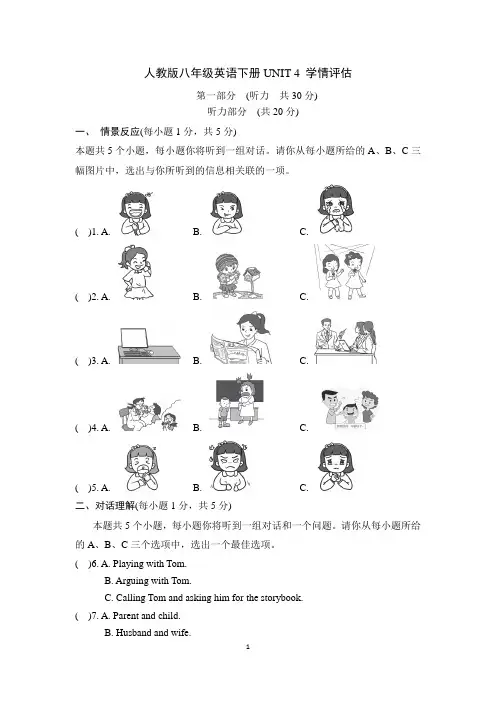
人教版八年级英语下册UNIT 4 学情评估第一部分(听力共30分)听力部分(共20分)一、情景反应(每小题1分,共5分)本题共5个小题,每小题你将听到一组对话。
请你从每小题所给的A、B、C三幅图片中,选出与你所听到的信息相关联的一项。
()1. A. B. C.()2. A. B. C.()3. A. B. C.()4. A. B. C.()5. A. B. C.二、对话理解(每小题1分,共5分)本题共5个小题,每小题你将听到一组对话和一个问题。
请你从每小题所给的A、B、C三个选项中,选出一个最佳选项。
()6. A. Playing with Tom.B. Arguing with Tom.C. Calling Tom and asking him for the storybook.()7. A. Parent and child.B. Husband and wife.C. Teacher and student.()8. A. In the hospital.B. In the library.C. In the museum.()9. A. How to send an email.B. How to say sorry to a friend.C. How to communicate with a shy person.()10. A. By sending flowers.B. By writing a letter.C. By making a phone call.三、语篇理解(每小题1分,共5分)本题你将听到一篇短文。
请你根据短文内容和所提出的5个问题,从每小题所给的A、B、C三个选项中,选出一个最佳选项。
()11. Why was Tony unhappy?A. He had a fight with his friend.B. He had bad grades.C. He had few friends.()12. What does Sonia ask Tony to try to be?A. More silent.B. More active.C. Much funnier.()13. What does Sonia ask Tony to do when he meets others?A. To say hello.B. To be very happy.C. To study hard.()14. What will make people think Tony is smart and great?A. Doing sports.B. Studying hard.C. Being very friendly.()15. How many pieces of advice does Sonia give Tony?A. One.B. Two.C. Three.四、听力填空(每小题1分,共5分)本题你将听到一篇演讲词。
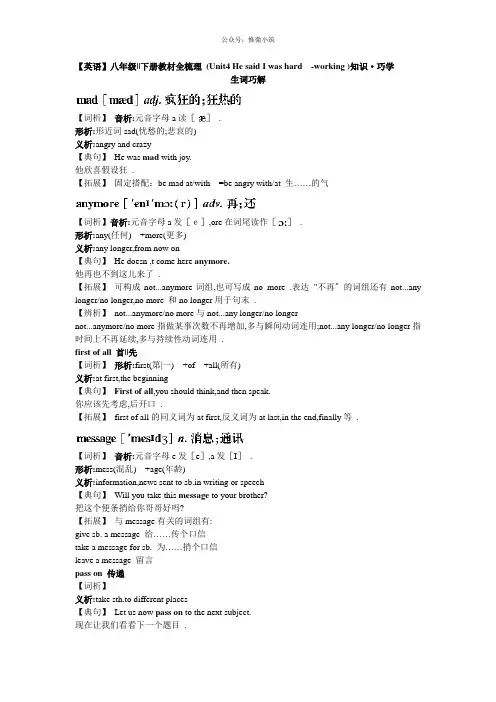
【英语】八年级||下册教材全梳理(Unit4 He said I was hard -working )知识·巧学生词巧解【词析】音析:元音字母a读[].形析:形近词sad(忧愁的;悲哀的)义析:angry and crazy【典句】He was mad with joy.他欣喜假设狂.【拓展】固定搭配:be mad at/with =be angry with/at 生……的气【词析】音析:元音字母a发[e],ore在词尾读作[].形析:any(任何) +more(更多)义析:any longer,from now on【典句】He doesn ,t come here anymore.他再也不到这儿来了.【拓展】可构成not...anymore词组,也可写成no more .表达"不再〞的词组还有not...any longer/no longer,no more 和no longer用于句末.【辨析】not...anymore/no more与not...any longer/no longernot...anymore/no more指做某事次数不再增加,多与瞬间动词连用;not...any longer/no longer指时间上不再延续,多与持续性动词连用.first of all 首||先【词析】形析:first(第|一) +of +all(所有)义析:at first,the beginning【典句】First of all,you should think,and then speak.你应该先考虑,后开口.【拓展】first of all的同义词为at first,反义词为at last,in the end,finally等.【词析】音析:元音字母e发[e],a发[I].形析:mess(混乱) +age(年龄)义析:information,news sent to sb.in writing or speech【典句】Will you take this message to your brother?把这个便条捎给你哥哥好吗?【拓展】与message有关的词组有:give sb. a message 给……传个口信take a message for sb. 为……捎个口信leave a message 留言pass on 传递【词析】义析:take sth.to different places【典句】Let us now pass on to the next subject.现在让我们看看下一个题目.【拓展】后接宾语时可以构成pass on sth. to sb./pass on sb. sth.,当宾语为代词时只能用前一种.【词析】音析:重读开音节词,u读作[],元音字母o发本音[].形析:sup(超) +pose(姿态)义析:think about sth.that is not real now【典句】Let ,s suppose (that) the news is true.让我们假定这消息是真的 .【拓展】固定搭配:be supposed to被期望或被要求do well in 在……方面做得好【典句】I do well in drawing.我擅长画画.【拓展】be good at 相当于do well in,意思为"擅长……〞.be good at 的比较级||为be better at,do well in 的比较级||为do better in .be in good health 身体健康【词析】形析:be +in(在……状态下) +good(好的) +health(健康)义析:keep healthy,keep fit【典句】I hope you are in good health.我希望你身体健康.【拓展】表示身体健康的其他短语有:be healthy 健康的stay/keep healthy 保持健康【词析】形析:er读作[],ou读作[].形析:nerv(e)(神经的) + -ous(形容词后缀)义析:not relaxed,not comfortable【典句】I felt very nervous when I went into his office.当我走进他的办公室时,我感到很紧张.【拓展】固定搭配:be nervous about对……感到紧张【词析】音析:重读闭音节词,字母u读作[],i和y读作[I].形析:lucky(幸运的)变y为i + -ly(副词后缀)义析:fortunately【典句】Luckily,the police came right away.很幸运,警察马上就来了.【拓展】1)同根词:luck n.运气;lucky adj.幸运的2)反义词:unluckily【词析】音析:元音字母u读作[],词尾的e不发音.形析:形近词blue(蓝色)义析:right,not against【典句】Is it true that you are rich?你很富有是真的吗?【拓展】同根词:truth n.真理;truly adv.真实地【词析】音析:ow读作[].形析:形近词town(城镇)义析:belong to oneself【典句】She makes her own clothes.她自己做衣服.【拓展】own作为形容词意为"自己的〞,常用在表示所有格的词后起强调作用.作为动词意为"拥有〞,名词为owner(主人) .轻轻告诉你Every heart has its own sorrow.各人有各人的苦恼.get over 克服;恢复;原谅【词析】形析:get(得到) +over(在上面)义析:recover,forgive sb.【典句】Can we get over this difficulty?我们能克服这个困难吗?【拓展】与get有关的词组有:get to 到达get on 上车get off 下车get ready for 为……作准备get up 起床【词析】音析:第|一个a读作[],第二个a读作[I] .义析:person who finish the study in a college【典句】Two thirds of the graduates find jobs.三分之二的毕业生找到了工作.【拓展】作为动词意为"毕业〞可构成graduate from "毕业于……〞.【词析】音析:闭音节词,字母i读作\I\] .形析:形近词than(比)义析:not dense or concentrated【典句】The air there is very thin.那里的空气很稀薄.【拓展】作"稀薄的〞讲时反义词为thick,作"瘦的〞讲时反义词为fat .【词析】音析:字母e和i均读作[I],sion读作[].形析:deci(de)(决定) +sion(名词后缀)义析:something you must make a choice at one time【典句】She could not make a decision about the dresses.她对(买不买)这衣服下不了决心.【拓展】make a decision to do sth. =decide to do sth.(决定做某事)【词析】音析:ar读作[].形析:star(星星) +t义析:begin【典句】If you are ready,you may start your work.如果你准备好了,你可以开始工作了.【拓展】start作为动词"开始〞时与begin同义,其后可接动名词或动词不定式.【辨析】begin与start一般情况下,这两个词都可接动名词或动词不定式,二者用法相同.以下两种情况下只能用start,而不用begin .1)当机器"开动、发动〞时.2)作为"旅途〞开始时.care for 照顾,照料【词析】形析:care(关心) +for(为了……)义析:take care of,look after【典句】The boy is too young to care for himself.这个男孩太小,不能照顾自己.【词析】音析:元音字母a发本音[eI],字母组合er发[].形析:d +anger (愤怒)义析:risk;a source or an instance of risk or peril【典句】In war,life is full of danger for everyone.在战争中,每个人的生活都充满了危险.【拓展】1)与danger有关的词组有:in danger 在危险中out of danger 出险;脱险2)danger的形容词形式:dangerous例句精讲Section ALana thinks she ,s coming to my house to study.拉娜以为她要到我家来学习.【巧解句构】这是一个含有宾语从句的主从复合句,主句为一般现在时态,从句是用趋向性动词come的现在分词表将来.【拓展延伸】宾语从句的时态必须与主句照应:当主句中谓语是现在或将来时态,从句谓语不受主句谓语时态的影响,可以按需要使用任何时态,例如:She says that she has never been to Mount Tai.1)当主句谓语为过去时态,从句中的时态一般为过去的某种时态.例如:He said he had finished his homework.2)当从句表达的是某一客观真理(事实)时,主句无论是何种时态,从句那么用一般现在时.例如:He said that light travels much faster than sound.误区警示假设宾语从句跟在动词think,believe,suppose,expect等表示"要,认为〞等的动词后时,句子的否认表达在主句上,这就是"否认转移〞现象.例如:I don ,t think you are right.我认为你不正确.I don ,t believe he has finished his work.我相信他还没有完成他的工作.Section B 3a1.I was sorry to hear that he had a cold last week.我听说他上周感冒了觉得很难过.【巧解句构】这是一句包含宾语从句的主从复合句.主句是过去时态,从句也用过去时态.本句中that变为了宾语从句he had a cold last week的引导词.【要点剖析】I was sorry to hear that...是表示遗憾的常用语,意为"我听到……很遗憾〞.have a cold意为"患感冒〞还可以写成catch a cold .类似的词组还有:have a cough 咳嗽have a fever 发烧have a headache 头疼2.I had a really hard time with science this semester,and I wasn ,t surprised to find that my worst report was from my science(科学)teacher.这学期我的科学课学得确实很吃力,所以当我看到最||糟糕的评价来自于科学课老师时,我毫不吃惊.【巧解句构】这是一句由and连接的并列句.前一个分句是简单句,后一个分句是包含宾语从句的主从复合句,主句I wasn ,t surprised to find "我毫不吃惊地发现……〞,不定式的动词find后面带一个由that引导的宾语从句.【要点剖析】词组have a hard time with sth.意为"应付某事很费力〞;be surprised to意为"对……感到吃惊〞,不定式后接动词的原形.surprised为形容词,surprise为名词构成to one ,s surprise(使……惊奇的是)词组.【辨析比较】surprised 和surprising1)当人作主语或修饰与人有关的词时用以ed结尾的形容词.2)当物作主语或修饰与物有关的词时用以ing结尾的形容词.例如:We are surprised to hear the surprising news.我们听到那条令人惊讶的新闻感到非常吃惊.3.The good news is that my math teacher said I was hard -working.好消息是数学老师说我很用功 .【巧解句构】这是一句包含表语从句的主从复合句 .主句the good news is使用的是一般现在时,表示目前的情况.由that引导的从句my math teacher said I was hard working在句中充当表语,使用的是一般过去时,陈述过去.其中又包含一个从句I was hard working,作said的宾语.【拓展延伸】表语从句于主句中的系动词之后,主要有四类:1)由连词who,what,which 等引导的表语从句.这些词不但可以起连接作用,还可以在句中作主语、宾语和表语.例如:China is not what she was yesterday.中|国已不再是以前的那个中|国了.2)由不充当任何句子成分的连词that,whether引起的表语从句.例如:What I mean is that we should help each other.我的意思是我们应该互相帮助.The problem is whether we can finish the work on time.问题是我们能不能按时完成工作.3)由连接副词when,where,why,how 引导的表语从句 .例如:This is when I really get to know Americans.我这时才开始认识美|国人.4)由连词as,because,as if,as though 引导的表语从句.例如:It looks as if it is going to rain tonight.看起来好似今晚要下雨.Self Check 2Last week in school we had a big fight,and she didn ,t talk to me.上周在学校我们大吵了一架,她不和我说话了 .【巧解句构】这是一个and连接的前后均是一般过去时态的并列句.【要点剖析】1)短语have a fight意为"吵架〞,后面接宾语时要加上介词with,即have a fight with等同于fight with sb.(此时的fight为动词) .2)短语talk to sb.意为"与……谈话/交谈〞,to也可以被with替换 .如果talk后面接的是"某事〞那么介词用about即talk about sth. .She said helping others changed her life.1.Teaching high school students in a poor mountain village in Gansu Province may not sound like fun to you.在甘肃省一个贫困山村教中学生,在你听来也许并不有趣 .【巧解句构】该句是个简单句.这句话的主语很长,一个动名词短语(teaching high school students "教中学生〞)加上两个地点状语(in a poor mountain village "贫困山村〞和in Gansu Province "甘肃省〞)构成了本句的主语.谓语局部那么使用了sound like短语,表示"听来并不有趣〞.【要点剖析】短语sound like 意为"听起来像……〞,sound是一个系动词,类似的词还有:feel,smell,taste,look,get,turn等.2.She said that both she and her husband thought this was a good idea.她和她丈夫都认为这是一件很好的事.【巧解句构】该句是个复合句,said后面的that引导的是宾语从句,是said的内容;句中的thought后面也是一个宾语从句,但省略了引导词that .通常宾语从句由that引导时,常可省去that,但said后的that常保存.【要点剖析】词组both...and...意为"(两者)都〞是并列连词可以连接两个人或物一起作主语.反义词为neither...nor...,它们的用法不同:neither...nor...引导的词作主语时谓语动词与nor 后的词保持一致即就近原那么;both...and...无此用法 .3.There is no difference between you and them.你和他们之间没有不同.【巧解句构】该句是一个there be句型,名词difference作句子的真正主语,no相当于not any .There is no difference between...and...意为"在……和……之间没有区别〞 .如果表示"有区别〞,那么使用There is a difference between...and...或者There are differencesbetween...and... .【要点剖析】词组between...and...表示"在……之间〞,between只用于二者之间.【拓展延伸】there be句型的一些用法:1)主谓一致谓语动词要采取就近一致原那么,和靠近be的主语一致.例如:There is a pen,two rulers in the box.盒子里有一只钢笔,两把尺子.There are two boys and a teacher at the school gate.门口有两个男孩,一个老师.2)主语后的动词形式在there be 句型中,主语与动词是主动关系时用现在分词;是被动关系时用过去分词.例如: There is a purse lying on the ground.地上有一个钱包.There are five minutes left now.现在还有5分钟.3)反意疑问句反意疑问句应与there be对应,而不是依据主语.例如:There is a radio on the table,isn ,t there?桌子上有一台收音机,是吧?There are more than fifty classes in your school,aren ,t there?你们学校有50个班,是吧?4)there be 与have的替换there be表示所属时可与have替换.There is nothing but a book in my bag. =I have nothing but a book in my bag.在我包里只有一本书.记忆要诀there be 句型的谓语歌诀there be句型可译"有〞,be 动词跟着名词走.名词单数不可数,当用is记清楚.如果名词是复数,用are一定要记住.出现并列主语特殊记, "就近原那么〞用仔细.4.I can open up my students , eyes to the outside world and give them a good start in life.我能为我的学生翻开眼界看外面的世|界,并且给他们的生活一个好的开始 .【巧解句构】该句是一个含有情态动词的一般现在时态的简单句,and连接前后两个并列谓语.【要点剖析】1)短语open up one ,s eyes 意为"使……开眼界〞.2)动词give有两种用法:give sb. sth.和give sth. to sb. .5.When her year was over,she said that she would return to the area after finishing her studies.一年期满时她说:毕业后她会回到这个地方.【巧解句构】该句是个包含时间状语从句和宾语从句的主从复合句.时间状语从句when her year was over意为"当她的一年(支教)期结束时……〞.主句是一个间接引语,that...studies作said的宾语从句,时态为过去将来时,说明是在"当时〞要离开的时候,杨蕾承诺"将来〞要回到这个地方;在这个宾语从句中after finishing her studies作为一个时间状语,点明了她将要回来的时间为"完成学业后〞.【要点剖析】1)短语be over意为"结束〞.2)return to...意为"返回……〞.语法解读直接引语和间接引语引述或转述别人的话称为"引语〞.直接引用别人的原话,两边用引号"〞标出,叫做直接引语;用自己的语言转述别人的话,不需要引号,叫做间接引语,实际上间接引语大都是宾语从句,其中由祈使句转换的间接引语除外,其转换后是不定式.那么直接引语为陈述句、一般疑问句、特殊疑问句和祈使句,转换为间接引语时,句子的结构,人称、时态、时间状语和地点状语等都要有变化,如何变化呢?一、人称的转变下面有一句顺口溜"一随主,二随宾,第三人称不更新〞可以帮助我们记忆."一随主〞是指在直接引语变间接引语时,如果从句中的主语是第|一人称或被第|一人称所修饰,从句中的人称要按照主句中主语的人称变化.例如:He said, "I am very happy.〞He said that he was very happy."二随宾〞是指直接引语变间接引语时,假设从句中的主语及宾语是第二人称或被第二人称所修饰,从句中的人称要跟引号外的主句的宾语一致.如果引号外的主句没有宾语,也可以用第|一人称,例如:She said to her son, "I ,ll check your homework tonight.〞She said to her son that she would check his homework that night."You should be more careful next time,〞my grandfather said.My grandfather said that I should be more careful the next time."第三人称不更新〞是指直接引语变间接引语时,如果从句中的主语及宾语是第三人称或被第三人称所修饰,从句中的人称一般不需要变化.例如:Mr.Smith said, "Jack is a good student.〞→ Mr.Smith said Jack was a good student.总之,人称的转换不是固定的,具体情况、具体对待,要符合逻辑.二、时态的转换直接引语改为间接引语时,主句中的谓语动词如果是过去时,从句(即间接引语局部)的谓语动词在时态方面要作相应的变化,变成过去时范畴的各种时态(实际也是宾语从句的时态要求),变化如下:一般现在时→一般过去时现在进行时→过去进行时现在完成时→过去完成时一般将来时→过去将来时一般过去时→过去完成时过去完成时→不变过去进行时→不变例如:1. "I am very glad to visit the Great Wall ,〞she said.→She said she was very glad to visit the Great Wall.2.Jim said, "We are listening to the music.〞→Jim said that they were listening to the music.3.Mother asked, "Have you finished your homework before nine o ,clock?〞→Mother asked me whether I had finished my homework before nine o ,clock.4.He asked the policeman, "Where shall I find the nearest bookshop?〞→He asked the policeman where he would find the nearest bookshop.5. "Why did she go there?〞the teacher asked.→The teacher asked why she had gone there.6.Mother asked me, "Had you finished your homework before supper?〞→Mother asked me whether I had finished my homework before supper.7.Tom said, "We were having a football match this time yesterday.〞→Tom said that they were having a football match that time the day before.三、结构的转换1.陈述句.用连词that引导,that在口语中常省略.主句的谓语动词可用直接引语中的said,也可用told来代替,注意,可以说said that,said to sb. that,told sb. that,不可直接说told that .例如:He said, "I have been to the West Lake.〞He said to us that he had been to the West Lake.He said, "I ,ll give you an exam next week.〞He told us that he would give us an exam the next week.(不可说told that)此外主句中的谓语还常用repeat,answer,reply,explain,think等.例如:He said, "I ,m late because of the heavy snow.〞He explained to us that he was late because of the heavy snow.2.直接引语为一般疑问句,也称是否疑问句,间接引语用连词whether或if引导,原主句中谓语动词said要改为asked(me/him/us等),语序是陈述句的语序,这一点非常重要.例如:He said, "Do you have any difficulty with this work?〞He asked (me) whether/if I had any difficulty with this work.3.直接引语为特殊疑问句,改成间接引语时,原来的疑问词作为间接引语的连词,主句的谓语动词用ask(sb.)来表达,语序改为陈述句语序.例如:He asked me, "How many classrooms have been built in your school?〞He asked me how many classrooms had been built in our school.4.直接引语为祈使句时,改为间接引语,用带to的不定式表达,谓语动词常是ask,advise,tell,warn,order,request等.如ask sb.to do,(由肯定祈使句变成)ask sb.not to do(由否认祈使句转变),并且在不定式短语中的时间状语、地点状语、人称及时态都作相应的变化.例如:He said, "Be quiet,please.〞He asked us to be quiet."Don ,t touch anything in the lab,〞the teacher said.The teacher warned the students not to touch anything in the lab.四、时间状语和地点状语的转换在直接引语中在间接引语中指示代词this thatthose表示时间的词now thenthat daythat week(month,etc.)the day beforethe week(month,etc.)beforethree days (a year ,etc.)beforethe next (following) daythe next (following)week (month,etc.)表地点的词动词there take go但要注意在以下几种情况,直接引语变为间接引语时,时态一般不变化:1.直接引语是客观真理."The earth moves around the sun ,〞the teacher told me.→The teacher told me the earth moves around the sun.2.直接引语如果是一般现在时,表示一种反复出现或习惯性的动作.例如:He said, "I get up at seven every morning.〞→He said he gets up at seven every morning.3.如果直接引语中的情态动词没有过去时的形式(例如:had better,used to)和已经是过去时的形式时,(例如:could,should,would,might)不再变.例如:Peter said, "You had better come have today.〞→Peter said I had better go there that day.听说速递1.表达观点I think you are...我想你是……I think you are right.Thank you.I think you are good at English.I think you are lazy.I think you are hard working.2.表达问候How ,s it going?一切都顺利吗?Does everything go well?Is everything going well?How are you?Fine,thanks.Best wishes to you.3.表达遗憾I ,m sorry to hear that...我听到……很遗憾.What a pity!I ,m sorry.It ,s unfair for you.4.表达希望I hope that...我希望……I hope that you are better now.I hope you are happy.Have a good time!Have a good trip.读写指导如何写好限制性作文【点石成金】1.仔细审题,明确要求.对题目所提供的信息要认真分析,明确要求,做到心中有数.要对所提供的信息加以分析、整理,使之更加具体化、条理化,为开始动笔作好前期准备工作.还要搞清这那么题目的要求是写短文、日记、信件还是便条等,以便根据不同的题材、体裁,写出不同格式、风格各异的文章.此外,也应注意所要求的人称、时间、地点、人物等信息,防止用错.2.抓住重点,寻求思路.根据题目所提供的信息,草拟一个提纲,寻求逻辑次序,确定从何下手,再围绕这一次序,周密选词、选句,以便更加贴近主题;否那么,语无伦次的文章将不会被人接受.3.用词恰当,表达流畅.在写作过程中,万一哪个词想不起来了,千万不能空着或不写,最||好找一个同义词或用其同义句、同义词组(短语)代替.表达中不写没有把握的句子,尽可能用自己熟悉的词和句子来表达意思.表达中,尽可能采用一些简单句,并使前后句、上下文过渡自然.正确使用and,or,but,because,so等词以便使行文自然流畅,使人读后不至||于有"死水一潭〞之感觉.还应注意各种时态、语态和各种句式的交替使用,使文章显得得体、大方、错落有致.4.成文之后全面检查全文.着重看是否存在以下问题:格式、拼写、标点、扣题、不标准英文、时态、语态、主谓一致、冠词、介词、单复数、比较级||别、顺序、大小写、代词等用法错误或使用不当.【常用词汇】ever,mad,anymore,pass on,suppose,do well in,in good health,nervous,worst,lucky,hers,own,get over,meter,ate,decision,open up,start,care for,danger 【常用句型】1)What did...say?……说什么了?2)He said I could...他说我能……3)He told me he would...他告诉我他将……4)Mary said she would...玛丽说她将……5)I think you are... 我想你是……6)How ,s it going?一切都顺利吗?7)I ,m sorry to hear that... 我听到……很遗憾.8)I hope that... 我希望……9)Really?You ,re lucky.真的?你真幸运 .典题·热题例1 (2021福建福州模拟) -Do you know _________?-She came by bus.A.when she got to schoolB.why she was late for classC.how she came to school this morningD.how many times she was late for class思路解析:此题考查宾语从句的用法.主句为一般现在时态,从句可以根据表达的需要选择任何时态.根据答语可知,从句应用一般过去时态.由"by bus〞可知,对于交通工具提问只能用"how〞.答案:C误区警示此题有两处误区:一是时态,主句为一般现在时态,从句往往会误用一般现在时态;二是语序,忽略宾语从句需用陈述句语序.例2 (2021浙江杭州模拟) -Why didn ,t Alice come to the party last night?-I don ,t know _________.A.why didn ,t sheB.why she didn ,tC.why did sheD.why she did思路解析:宾语从句应用陈述句语序,故A、C项错,由题意可知,是"我不知道她为什么不来〞应用否认句,故D项错.答案:B例3 (2021湖北黄冈模拟) -Can you see ___________?-No,let ,s go and have a look.Maybe we can help them.A.what was happening thereB.what are they doing thereC.what are they talking aboutD.what is happening there思路解析:此题考查的是宾语从句的用法.当问及"你能看见……〞时,可知事情正在进行,因此应该用现在进行时态,故A不对.宾语从句应按陈述句语序排列,故B、C两项不对.D项中的what作主语,故D项是正确的.答案:D例4 (2021南通模拟) When you are sleeping,you had better _______ all your windows closed.,t keep B.not keepC.not to keepD.not keeping思路解析:此题考查had better的用法 .had better无论是用在肯定句还是在否认句中,后面都只能接动词原形.因此,C、D项均错.而had better的否认形式为had better not,故A错.答案:B误区警示better为形容词good和副词well的比较级||,这使人常常会想起"be +adj. +to do〞这种结构,会误以为had better to do sth.是正确搭配,从而错选C项 .深化升华记牢"had better(not) +动词原形〞这种结构.例5 (2021南京模拟)Susan is always the best in different exams in our class because she is a ___________ girl.-working思路解析:此题考查词的用法.此句意为"苏珊在我们班的不同的考试中总是最||好的〞,而helpful意为"有帮助的〞,polite意为"有礼貌的〞proud意为"自豪的〞,hard -working意为"努力的〞,只有hard -working与题意相符.答案:D误区警示多数形容词都可作定语修饰名词,如果不能理解词义,很容易出现误选.深化升华多动口,多动手,勤读读,多练练,掌握词的音、形、义就一路畅通了.例6 完形填空(2021河北模拟)Big schoolbags have been a serious problem for students for a long time.Maybe your schoolbags is too 1 to carry,and it troubles you a lot 2 you want to find a book out to read.Now an e -textbook will 3 you.It is said that e -textbooks are going to be 4in Chinese middle schools.An e -textbook,in fact,is a small 5 for students.It is much 6 than a usual schoolbag and easy to carry.Though it is as small as a book,it can 7all the materials(材料) for study.The students can read the text page by page on the 8,take notes with the pointer(屏写笔),or even "9〞their homework to their teachers by sending e mails.All they have to do is to press a button.Some people say e -textbooks are good,but some say they may be 10for thestudents , eyes.What do you think of it?D.understandD.practice9.A.find out B.hand inC.get backD.give back思路分析:此题为完形填空题,是模拟必考题之一也是一道综合题.应从四方面入手:1.认真阅读短文,从句意词义入手,选择适当的词填空.2.从词的用法入手,看考查的是哪个词,它有什么用法.3.从固定搭配入手,包括介词的用法.4.从时态入手,根据时态的不同选用不同的动词形式 .在正确理解句意的前提下,抓住关键句,找到突破口.运用学过的词,词组或语法对空下"药〞.希望能在不断的练习中提高自己的综合语言运用能力,提高自身的素质.答案:1~5 BDCAD6~10 BACBD深化升华1.由"Big schoolbags have been a serious problem for students for a long time.〞可以判断出.2.由句意可知此句为"当你想找出一本书来读时,他会麻烦很多〞因此只能由when来引导时间状语从句.3.由句意可知"现在一本e -textbook将帮助你〞.4.比照各选项的词义可判断出,这里指"被使用〞.5.通读全文我们可以知道既可以用屏写笔在上写也可以读,可以判断出只能是台电脑.6.因为本文是对学生们的书包越来越重深表担忧,因此e textbook肯定更轻,因此lighter 符合题意.意为"保持,保存〞,build意为"建筑,建造〞,discover意为"发现〞,practice意为"练习,实践〞.根据词义只有hold符合题意.8.这是一种电子书因此只能有screen(荧屏) .9.根据选项的词义以及句意只有hand in(上交)与作业有关.表转折,因此前面说好(good)后面一定与此相反(bad) .例7任务型阅读(2021福建福州模拟)。
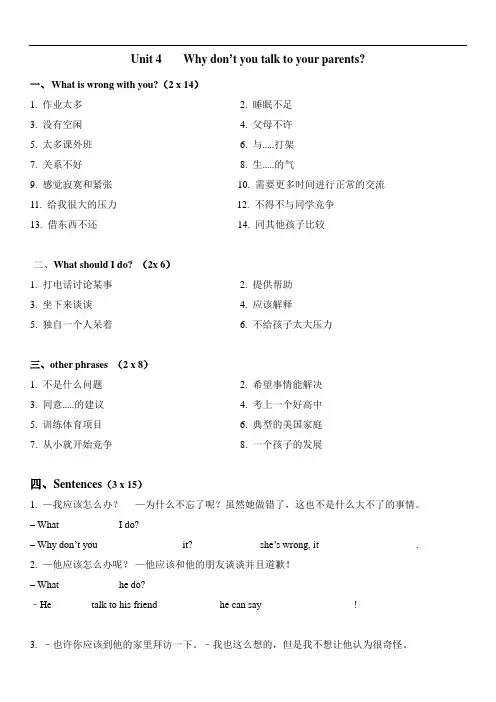
Unit 4 Why don’t you talk to your parents?一、What is wrong with you?(2 x 14)1. 作业太多_________________________2. 睡眠不足___________________________3. 没有空闲_________________________4. 父母不许___________________________5. 太多课外班________________________6. 与…..打架__________________________7. 关系不好________________________ 8. 生…..的气_________________________9. 感觉寂寞和紧张____________________ 10. 需要更多时间进行正常的交流______________ 11. 给我很大的压力____________________ 12. 不得不与同学竞争____________________ 13. 借东西不还________________________ 14. 同其他孩子比较____________________二、What should I do? (2x 6)1. 打电话讨论某事_____________________2. 提供帮助________________________3. 坐下来谈谈________________________4. 应该解释________________________5. 独自一个人呆着_______________________6. 不给孩子太大压力___________________三、other phrases (2 x 8)1. 不是什么问题_____________________2. 希望事情能解决__________________________3. 同意…..的建议_______________________4. 考上一个好高中__________________________5. 训练体育项目________________________6. 典型的美国家庭__________________________7. 从小就开始竞争________________________8. 一个孩子的发展__________________________四、Sentences(3 x 15)1. —我应该怎么办?—为什么不忘了呢?虽然她做错了,这也不是什么大不了的事情。
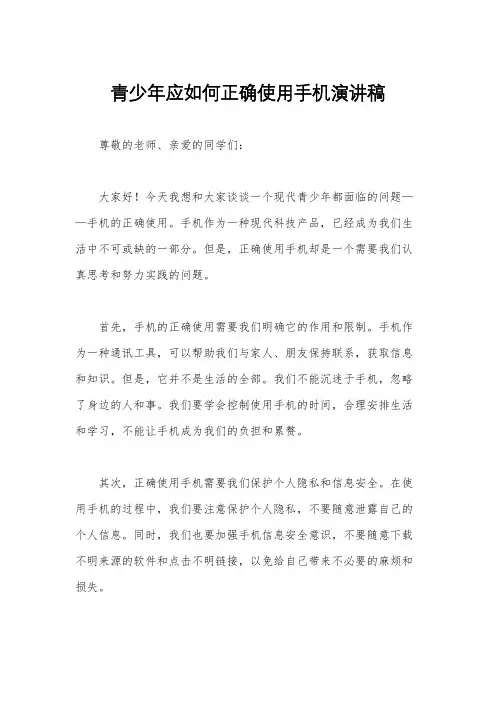
青少年应如何正确使用手机演讲稿尊敬的老师、亲爱的同学们:
大家好!今天我想和大家谈谈一个现代青少年都面临的问题——手机的正确使用。
手机作为一种现代科技产品,已经成为我们生活中不可或缺的一部分。
但是,正确使用手机却是一个需要我们认真思考和努力实践的问题。
首先,手机的正确使用需要我们明确它的作用和限制。
手机作为一种通讯工具,可以帮助我们与家人、朋友保持联系,获取信息和知识。
但是,它并不是生活的全部。
我们不能沉迷于手机,忽略了身边的人和事。
我们要学会控制使用手机的时间,合理安排生活和学习,不能让手机成为我们的负担和累赘。
其次,正确使用手机需要我们保护个人隐私和信息安全。
在使用手机的过程中,我们要注意保护个人隐私,不要随意泄露自己的个人信息。
同时,我们也要加强手机信息安全意识,不要随意下载不明来源的软件和点击不明链接,以免给自己带来不必要的麻烦和损失。
最后,正确使用手机需要我们遵守社会公德和法律法规。
在使用手机的过程中,我们要尊重他人,不要在公共场合大声喧哗或打电话,不要在课堂上偷偷玩手机。
同时,我们也要遵守网络道德和法律法规,不要传播不良信息、违法信息,不要参与网络欺凌和网络暴力行为。
总之,正确使用手机是我们每个青少年都应该认真思考和努力实践的问题。
我们要明确手机的作用和限制,保护个人隐私和信息安全,遵守社会公德和法律法规。
只有这样,我们才能充分发挥手机的作用,让它成为我们生活和学习的助手,而不是我们的累赘和负担。
谢谢大家!。
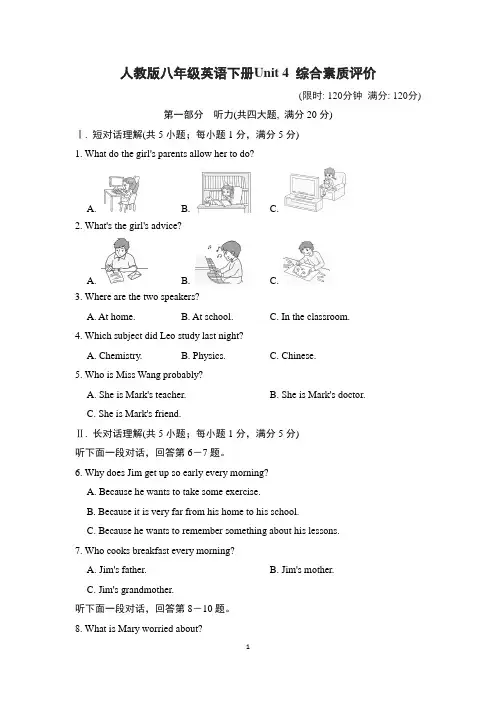
人教版八年级英语下册Unit 4 综合素质评价(限时: 120分钟满分: 120分)第一部分听力(共四大题, 满分20分)Ⅰ. 短对话理解(共5小题;每小题1分,满分5分)1. What do the girl's parents allow her to do?A. B. C.2. What's the girl's advice?A. B. C.3. Where are the two speakers?A. At home.B. At school.C. In the classroom.4. Which subject did Leo study last night?A. Chemistry.B. Physics.C. Chinese.5. Who is Miss Wang probably?A. She is Mark's teacher.B. She is Mark's doctor.C. She is Mark's friend.Ⅱ. 长对话理解(共5小题;每小题1分,满分5分)听下面一段对话,回答第6-7题。
6. Why does Jim get up so early every morning?A. Because he wants to take some exercise.B. Because it is very far from his home to his school.C. Because he wants to remember something about his lessons.7. Who cooks breakfast every morning?A. Jim's father.B. Jim's mother.C. Jim's grandmother.听下面一段对话,回答第8-10题。
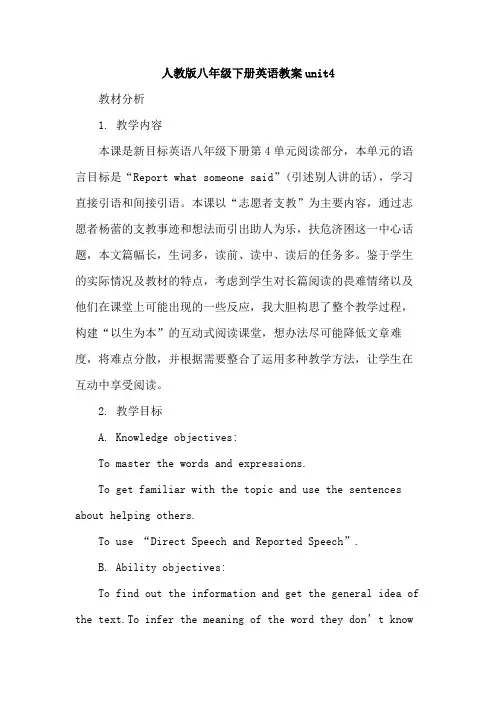
人教版八年级下册英语教案unit4教材分析1. 教学内容本课是新目标英语八年级下册第4单元阅读部分,本单元的语言目标是“Report what someone said”(引述别人讲的话),学习直接引语和间接引语。
本课以“志愿者支教”为主要内容,通过志愿者杨蕾的支教事迹和想法而引出助人为乐,扶危济困这一中心话题,本文篇幅长,生词多,读前、读中、读后的任务多。
鉴于学生的实际情况及教材的特点,考虑到学生对长篇阅读的畏难情绪以及他们在课堂上可能出现的一些反应,我大胆构思了整个教学过程,构建“以生为本”的互动式阅读课堂,想办法尽可能降低文章难度,将难点分散,并根据需要整合了运用多种教学方法,让学生在互动中享受阅读。
2. 教学目标A. Knowledge objectives:To master the words and expressions.To get familiar with the topic and use the sentences about helping others.To use “Direct Speech and Reported Speech”.B. Ability objectives:To find out the information and get the general idea of th e text.To infer the meaning of the word they don’t knowfrom the context.C. Affective objectives:Students are to realize the importance of helping others and they are encouraged to help others.Students’ team spirit will be improved by completing a certain task together.By understanding the life in rural areas, students are to realize how happy they are.3. 教学策略:(1)兴趣激发策略。
人教版英语八年级下Unit 4 Why don’t you talk to your parents?知识点总结+单元练习题(原创+答案)1一.重点词组:1.what’s wrong 哪不舒服?what’s wrong with sb 某人怎么了?2.look through 快速查看,浏览look up 查询look for 寻找look after 照顾look out = watch out 当心3.big deal 重要的事it’s not a big deal 不是要紧的事4.work out = figure out 解决,弄明白5.not...anymore 再也不6.cut out 删去pare...with 比较8.in one’s opinion 在某人看来9.hang out with sb 和某人闲逛10.after-school class 校外辅导课11.get into fight with sb 和某人打起来12.be angry with sb 对某人生气13.why don’t you do = why not do sth 为什么不做某事14.get on with sb 和某人相处得好15.be nice to sb 对某人友好16.mind sb doing sth 介意某人做某事17.on weekends 在周末二.重点单词1.allow v 允许allow doing sth 允许做某事allow sb to do sth 允许某人做某事sb is allowed to do sth 某人被允许去做某事2.guess v/n 猜have a guess = take a guess 猜一猜guess what? 您猜怎么着?3.deal v 处理;n 交易deal with sth 处理... = handle sth4.relation n 关系relative adj 相对的;n 亲戚relationship n 关系be related to sth 与...有关munication n 交流communicate v 交流6.argue v 争吵argue with sb 和某人争吵argument n 论点7.cloud n 云朵clouds 乌云8.instead adv 反而用法1:放在句首使用:She isn’t allowed to go out at this time of night. Instead, she should do her homework in her bedroom.用法2: 放在句尾连起来使用:She isn’t allowed to go out at this time of night. She should do her homework in her bedroom instead.instead of + 名词性短语9.nervous adj 焦虑的be nervous of/about sth10.offer v/n2offer sb sthprovide sth for sb = provide sb with sth supply sth for sb = supply sb with sth 11.proper adj 恰当的improper adj 不恰当的suitable adj 恰当的12.explain v 解释explanation n 解释13.clear adj 清晰的a clear day 晴天crystal clear 一清二楚的14.return v 返回return back 返还return to sb 还给某人15.member n 成员membership n 会员资格16.pressure n (物理)压力release pressure 释放压力stress (精神)压力reduce stress 减少压力pete v 竞争compete against sb 与某人竞争、攀比competition n 比赛competitive adj 竞争激烈的,好竞争的competent adj 有能力的,能胜任的18.skill n 技巧19.typical adj 典型的20.football n 美式橄榄球soccer 英式足球21.continue v 继续22.crazy adj 疯狂的be crazy about sth 对...感到痴狂23.push v 推push-up 俯卧撑pull v 拉24.develop v 发展development n 发展25.cause v 造成;n 原因cause sb to do sth 引起某人去做某事ual adj 平常的as usual 像往常一样27.perhaps adv 或许probably adv 或许possibly adv 或许34Unit 4 单元练习题一.重点词组考察二.重点单词考察三.课文翻译1. I have _____ _____ (太多) homework so I don’t have enough sleep.2. My parent don’t _____ _____ _____(允许我) hang out with my friends.3. I have _____ _____ (太多) after-school classes.4. I _____ _____ (陷入) a fight with my best friend.5. _____ _____ _____ (你为什么不)go to sleep earlier this evening?6. The house is _____ _____ (已经相当) clean and tidy.7. I found my sister _____ _____ (翻找) my things yesterday. 8. I guess you could tell her _____ _____ _____(去道歉).9. My problem is that I can’t _____ _____ _____ (和某人相处) my family. 10. My _____ _____ (大哥) is not very nice to me.11. He always _____ _____(拒绝) let me watch my favorite TV show. 12. It’s not easy _____ _____ _____ (处于你这个年龄). 13. You should _____ _____ _____ (提供去帮助).14. You don’t _____ _____ _____ _____ _____ _____ _____ (介意他一直在看电视).15. My sister borrows my clothes _____ _____ (没有问). 16. I am _____ _____ (担心) my school grades.17. You should tell him that _____ _____ _____ (抄别人的作业) is wrong. 18. _____ _____ _____ (他们中的许多人) are learning exam shills so that they can get into a good high school.19. They are always _____ _____ _____ (把他们和...做对比) other children.四.单项选择1.We can’t take this away until she _____ yes.A.will sayB. sayC. saysD. said2.She finally agrees with us _____ she did not like the plan at the beginning.A.ifB. unlessC. althoughD. when3.---Thanks for your sincere suggestion.---It’s my pleasure. Hope things _____.A.work outB. look outC. try outD. find out4.We are not allowed _____ or drink in the classroom.A.eatB. to eatC. eatingD. eaten5.The little boy _____ his book to the girl.A.providesB. suppliesC. bringsD. offers6.---Young people are always talking on their phones.---Yes, indeed. They should put down their phones and talk to people around them _____.A.stillB. eitherC. tooD. instead7.My _____ sister is three years _____ than me..A.elder; olderB. elder; elderC. older; elderD. older; older8.They didn’t leave for home _____ they finish their work.A.untilB. ifC. unless9.Chinese parents tend to compare their children _____ other kids.A.forB. toC. byD. with10.Do you mind me _____ the radio? It’s too noisy.A.turning upB. turning onC. turning downD. turn down11.Gloria offers _____ us prepare for the exams.A.helpB. to helpC. helpingD. helped12.Did you watch the TV show _____ the evening of August 24th?---Yes, I did. _____ my opinion, it’s wonderful.A.in, InB. in; OnC.on; OnD. on, In五.完形填空As though things weren’t 1._____ enough last spring, a wild turkey started showing up on my block. It’s normally one of the busiest intersections in Minneapolis, but this turkey walked down the sidewalk day after day 2._____ she belonged. As word 3._____ about her, more and more people came out to see her. A young woman told me that they had named her Tina—Tina the Turkey. Tina must have been 4._____ eggs in front of the neighbors’ house. She would sit and wiggle her rump in the same place in their yard every day. One day she walked with five other 5._____ through the parking lot, 6.______ the two-and-a-half-foot cement wall, and into the yard. I watched in surprise—six wild turkeys! One had her feathers ruffled; I think it must have been Tina. This was her 7._____ now. There were many days when Tina would stand in the parking lot—a dangerous place for a 8._____ bird—and refuse to move, blocking cars from coming or going. This became a show with Tina in the starring role until the day a new character appeared on stage: an strange-looking man with black hair. He looked 9._____. He was covered in dirt, his posture stiff. He approached Tina and began to strike curious poses in a beautiful dance. Tina 10._____ him in this dance. Together, they were art in motion. And because of the stay-at-home order, I got to see them. I’ll always remember this turkey when I think back on the corona-virus pandemic. She brought a lot of joy to a community at a time when people desperately needed an escape.1.A. funny B. strange C. wonderful D. humorous2.A. as if B. if C. even if D. even though3.A. gave out B. handed out C. set out D. got out4.A. lying B. laying C. lied D. laid5.A. neighbors B. places C. turkeys D. women6.A. on B. up C. in D. with7.A. place B. turkey C. right D. wall8.A. fat B. strong C. powerful D. slow-moving9.A. homeless B. hopeless C. strange D. careful510.A. embraced B. joined C. welcomed D. invited 答案:一.重点词组1.what’s wrong with sb2.look through3.look for4.big deal5.look out6.work out7.not ... anymore8.cut outpare ... with ...10.hang out with sb11.after-school class12.in one’s opinion13.get into fight with sb14.be angry at sb15.be friendly to/with sb16.on weekends17.sllow doing sth18.allow sb to do sth19.be allowed to do sth20.guess what21.a clear day22.crystal clear23.return back24.return to sb25.be crazy about26.cause sb to do sth27.as usualpete with/against29.help with sth630.reduce stress; release pressure31.be related to32.find sb doing sth二.重点单词1.relation2.relativemunication; communicate4.argument5.clouds6.continue7.anyway8.proper; improper9.sick; ill10.member11.membership12.neighborhood13.typical三.课文翻译1.too much2.allow me to3.too many4.get into5.Why don’t you6.already pretty7.looking through8.to say sorry9.get on with10.elder brother11.refuses to12.being your age13.offer to help14.mind him watching TV all the time15.without asking16.worried about17.copying others’ homework18.Many of thempare them with四.单项选择1-5 CCABD5-10 DAADC11-12 BD五.完形填空1-5 BADBC6-10 BADAB7。
一、选择题1.— I am really __________ before the competition.— Take it easy. Sure you are the best.A.cool B.nervous C.serious D.patient B解析:B【解析】句意:-在比赛之前我真的很紧张。
-放轻松,你一定是最好的。
cool酷的,凉爽的;nervous紧张的;serious严肃的,认真的;patient有耐心的。
根据句意before the competition和下面的回答Take it easy可知,说话人感到很紧张,故选B。
2.He didn’t walk slowly ______ he was sure nobody was following him.A.and B.since C.until D.but C解析:C【解析】句意:他走得很慢,直到确信没有人在跟踪他。
考查连词辨析题。
A. and和,表并列;B. since由于,表原因;C. until直到……才,表时间;D. but但是,表转折。
根据句意结构,可知ABD三个选项意思都与句意不符,故选C。
3.I feel too sick to ______. I have to take a break.A.appear B.agreeC.rest D.continue D解析:D【解析】句意:我觉得太恶心了,不能继续了。
我得休息一下。
考查动词辨析题。
A. appear出现;B. agree同意;C. rest休息;D. continue继续。
too…to…太……而不能……;sick不舒服的;take a break休息一会;根据句意结构,可知选D。
4.Mrs. Green has to ______ her little daughter or she won’t work hard at all.A.hate B.hurtC.invite D.push D解析:D【解析】句意:格林太太得推动她的小女儿,否则她根本不用功。
2021年中考英语专题练习(八下Unit4)一、单项填空1. Ben was helping his mother when the rain began to heat heavily ________the windows.A. againstB. acrossC. aboveD. below2. Don't try to do everything at once. Take it a bit________.A. at timesB. at that timeC. at all timesD. at a time3. ( 2020·南京)China's efforts to stop the spread of COVID-19 will________ the world's ability to limit the harm in the near future.A. imagineB. inventC. insistD. improve4. Yesterday afternoon Lily tried to catch a butterfly in her garden, but it________from her at last.A. put awayB. got awayC. moved awayD. took away5.The little boy________something from behind his back and handed it to his mother. It was a flower.A. liftedB. showedC. searchedD. pulled6. Learning Chinese really________my mind to the Chinese world.A. called upB. turned upC. opened upD. made up7.—Can Chuying Football Team win the game?—It ________, but it's hard to say. The other team is excellent too.A. canB. mustC. mayD. should8.—Have you ever been to Nantong?—Yes. In fact, I________there for four years but now I work in Suzhou.A. studiedB. have studiedC. was studyingD. would study9. In our school library, there are many books like English books, Chinese books________.A. for exampleB. and so onC. such asD. also10.—I'm afraid not all the students have got used to online learning.—_________.A. That's a good ideaB. I agree with youC. That's all rightD. Never mind二、完形填空People always have communication with each other. In the past when they couldn't write, they used simple symbols to send their messages. Some groups of North American Indians were good at 1 messages. For example, a small stone on top of a large one meant "This is the way."If there was another small stone on the right, it meant "Turn right". Some grass with a knot meant "Danger!"and so on.In forests of Africa, it was 2 to travel between villages. But drum sound could be heard from many kilometres away. So, some groups of Africans made their drums " 3 " like people.The Incas of South America used to send messages by tying knots with ropes. Messages havebeen found, but 4 can understand what they mean. And the Egyptians used pictures as a kind of 5 , but only a few people were 6 to understand them.Today, we also use a lot of symbols. When we are in a car and we see a red light, we stop the car. When a mother says to her child, "Eat your cake!"the child eats the cake. Sometimes the red light and the words of the mother are symbols. And the 7 of course, is that the 8 way of communication between people is sound.There are more than 3, 000 languages in the world today. And about 13 of them are spoken by large groups of people. Languages of the world are both similar and different. They are similar because we can talk and write about the same things. They are different because we talk and write about these things with different 9 .There is no 10 that we learn a second language in order to communicate with people who do not speak our language.1. A. sending B. spreading C. publishing D. giving2. A. difficult B. easy C. interesting D. boring3. A. say B. speak C. tell D. whisper4.A. anybody B. somebody C. everybody D. nobody5. A. hearing B. thinking C. writing D. reading6. A. learned B. taught C. made D. told7. A. matter B. fact C. condition D. situation8. A. important B. necessary C. basic D. First9. A. symbols B. signs C. expressions D. words10. A. doubt B. discussion C. chance D. choice三、阅读理解As a kid, I walked to the library several times a weekand stayed up late reading. I checked out so many books and returned them so quickly that the librarian once snapped, "Don't take so many books home if you're not going to read them all.""But I did read them all," I said.In college, when I created my online dating(约会) profile, in the"favourite books"section I put One Hundred Years of Solitude, A Moveable Feast, White Fang and so on. But I realized I hadn't read most of those titles for two years.David was my first online date. David read about abook or two a week. When, we compared libraries, we had only four titles in common.On our seventh date, David and I visited the library."I have a game,"he said, taking out two pens and Post-it notes(便利贴)." Let's find books we've read and leave reviews in them for the next person."We stayed there for an hour.Before leaving, I said, "I will tell you something. I've only read one book this year.""But you like books,"he said. "You like book stores. You line libraries. Read a book!"I bought books whenever I got the chance, but I hardly read them. They sat on every surface until my house appeared to wear books the way one wears clothes."How's your day?" David texted."Good. A little tired,"I replied. "I stayed up late and finished my book."The last time I'd pulled an all-nighter to read, I was 12 and the book was Little Women.David suggested we visit the library again. He pulled a book from the shelf, dropped to one knee, and opened it.Inside, his Post-it note read, "Karla, it has always been you. Will you marry me?"His proposal had rested in the book for over a year.1. How do the first two paragraphs help develop the story?A. To show how rude the librarian was.B. To show Karla was always a reader,C. To prove Karla just liked borrowing booksD. To prove it's better to buy books than borrow books.2. Which is the CORRECT order of what happened toKarla?a. She had a game with David.b. She created her online dating profile.c. She was shown the Post-it note written to her.d. She told David she only read one book that year.e. She found they had only four titles in common.A. dbeacB. baecdC. beadcD. dbace3. Which sentence should go in the empty box in Paragraph 5from the bottom?A. I just loved the idea of reading.B. I tried to appear to be a book lover.C. I painfully realized most of my books went unread.D. I felt him pushing me to be more of the person I usedt o be.4. What's the best title for the passage?A. Falling in love by the bookB. Buying books for yourself not for your shelfC. A true lover of books knows no timeD. Love books enough and books love you back四、词汇检测1. How many ________ (胃)does a cow have?2. Annie's father had her diaries________ (出版), and soon the little girl's sad story touched people all over the world.3. Look! The boy is________ (捆)his magazines with strings. Let's help him.4. You can never imagine how difficult the road to ________ (成功)is.5. The second painting looks much________ (丑陋的) than the first one.6. She said she would never forget some pleasant ________ (经历)while working in China.7. Although it was raining hard, the farmer________ (继续)working in the field.8.—When did you begin to________this company?—I have been in charge of the company sine three years ago.9.—Did Helen accept your present?—No, she________to accept it.10.—Why do you like playing this kind of game?—Because it can test my________of English.五、句子翻译1.到目前为止,我的家乡种植了成千上万棵树。
牛津八年级下学期Unit4试题Ⅰ. 单项选择(每小题1分,共15分)( ) 1.—good advice Jim has offered!— Yes. He always has so many good ideas.A. WhatB. What aC. HowD. How a( ) 2. My grandpa always drinks a glass of water after he gets up every morning. He has had the good for many years.A. exerciseB. resultC. hobbyD. habit( ) 3. After the long walk, we both sat the tree with tired bodies.A. ontoB. intoC. withD. against( ) 4.— Did James invite you to his party?— Yes. But I had to it because it was hard for me to spare time for it.A. acceptB. refuseC. returnD. receive( ) 5. Lily borrowed my bike and it for a week.A. keepsB. keptC. has borrowedD. borrowed( ) 6.— I found the book so boring.— I had no interest in it, .A. alsoB. tooC. eitherD. instead( ) 7. A mother tiger can give birth to 3-5 babies .A. at timesB. on timeC. at the timeD. at a time( ) 8. Be careful with the machines and you touch any of them!A. mustn’tB. needn’tC. don’t have toD. may not( ) 9.— How is your work?— I started working early and half of it so far.A. didB. will doC. have doneD. was doing( )10. We had bad weather this Friday. So we didn’t hold the sports meeting.A. sinceB. afterC. untilD. for( )11. I was very nervous when I began to ma ke the speech. I didn’t even know to start with.A. howB. whenC. whyD. what( )12. No one can take the newspapers home. We should before we leave the reading room.A. hand in themB. hand them inC. give them awayD. give away them ( )13. The hotel was far from the station. Luckily, we the train.A. tried to catchB. failed to catchC. managed to catchD. rushed to miss( )14. — Excuse me, do you mind if I keep the book a little longer?—. But you should renew it first.A. Sorry, I doB. Of courseC. Yes, pleaseD. Not at all( )15. — Which of the four books would you like to read most?I’d choose . I like travelling, you know.A. B. C. D.Ⅱ. 完形填空(每小题1分,共10分)Yesterday afternoon, when I was doing my homework, Angela called. She said she was calling me 16 her mobile phone in her biology class, 17 the professor (教授) was teaching in the front of the classroom. I couldn’t 18 she made a phone call during the class.Angela said her biology class was very 19 . Some of her classmates were sleeping in class, some were talking about 20 plans for the weekend and the classmate next to her was 21 a picture of a horse.While we were talking, I heard her 22 shouted, “Miss, are you making a phone call?”23 , the phone went dead. I 24 the phone and then went to the kitchen to make dinner. As I was cutting vegetables, the 25 rang once again. It was Angela, but this time she wasn’t sitting in the classroom.( )16. A. for B. on C. of D. in( )17. A. because B. who C. if D. and( )18. A. believe B. hope C. agree D. see( )19. A. funny B. strict C. boring D. careful( )20. A. my B. their C. her D. our( )21. A. lending B. paying C. buying D. drawing( )22. A. classmate B. mother C. professor D. friend( )23. A. Recently B. Luckily C. Suddenly D. Hardly( )24. A. hung up B. picked up C. cut off D. went off( )25. A. alarm B. phone C. computer D. doorbellⅢ. 阅读理解(每小题2分,共20分)ADavid Moore taught Science at the City School. He needed some expensive books, so he bought some. He put the books in his car in a quiet street. Then he went to other shops to buy something else. At six he came back to the car. One door was open—and the books were not there!David drove home to Fry Road.On Friday people read this in the newspaper:Books: Do you have any old books? I buy old and modern books. Open all day on Saturdays. David Moore, 26 Fry Road.David stayed at home on Saturday. The first man came at eight. David took him to the kitchen. At half past nine another man arrived. He had a bag under his arm.“Mr Moore?” the man asked.“That’s right,” David said. “Can I help you?”“I’ve got some good books. You buy books, don’t you?”“Yes. Bring them in. Let me have a look.”Soon the books were on the dining tab le. “Come in now,” David called, “and bring the list.”A policeman came into the dining room. He read the names on the books and the names on the list in his hand. They were the same.“Come with me, sir. We’d like to talk about if you’re a thief (小偷),” the policeman said to the man.( )26. Mr Moore was a .A. doctorB. booksellerC. teacherD. musician( )27. Mr Moore lived .A. at No. 26 Fry RoadB. in a quiet streetC. close to the police stationD. at the City School( )28. Mr Moore probably bought the books on .A. WednesdayB. FridayC. SaturdayD. Sunday( )29. Mr Moore wrote a letter to a newspaper in order to .A. tell people that he had lost some booksB. tell the policeC. buy the expensive booksD. find who took the books( )30. Mr Moore stayed at home that Saturday because .A. he didn’t like to go out on SaturdayB. he didn’t need to go to school that dayC. he was waiting for the thief to comeD. he was busy reading the booksBHelping your children to read and write at home will improve their skills and confidence. It will also make them get ready for learning in the classroom.Every child needs (32)in every year of their life in or outside school. Students with good reading and writing skills will improve their ability (能力) to use the English language correctly.As parents, you can play an important role in improving your children’s reading and writing ability.Here are 8 tips on how to help your children to read and write:Having everyday conversations with your childrenTrying to ask more “wh-” questions instead of easy “yes” or “no” questionsEncouraging your children to talk about events you don’t knowReading to your children each nightListening to your children readTeaching your children how to use dictionaries (字典)Talking about your children’s writingPracticing filling in forms, writing letters, sending cards or emailsYou can also encourage your children to join the Reading Challenge Club. In the club, children must read 15 books from the club book list and 5 more books chosen by themselves. The reading must be done in one year. What’s more, it is a wonderful way to help your children to write. For example, you can encourage them to write diaries or book reviews.( )31. This passage is mainly written for .A. childrenB. teachersC. parentsD. doctors( )32. is the best for the missing part in Paragraph 2.A. “Listening and speaking skills”B. “Reading and writing skills”C. “Listening and writing skills”D. “Reading and listening skills”( )33. is NOT mentioned in the 8 tips above.A. “Listening to the radio every day”B. “Listening to your children read”C. “Reading to your children each night”D. “Talking about your children’s writing”( )34. In the Reading Challenge Club, children must read from the club book list in one year.A. 5 booksB. 10 booksC. 15 booksD. 20 books( )35. Parents can help children to write by encouraging them to .A. draw pictures or take photosB. listen to pop musicC. write diaries or book reviewsD. play computer gamesⅣ. 填空(每小题1分,共15分)A. 根据所给英语解释或者汉语意思,用合适的单词填空。